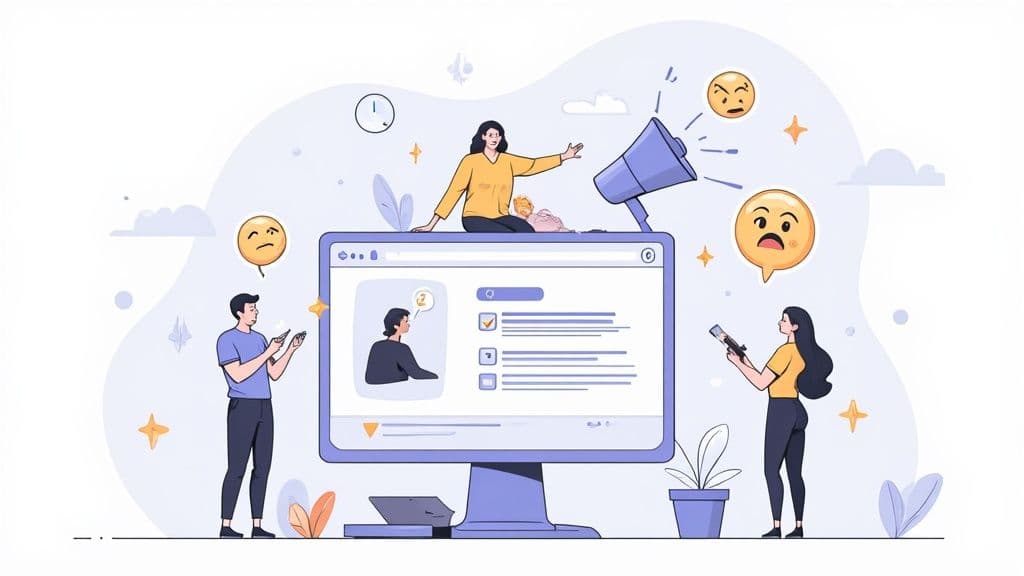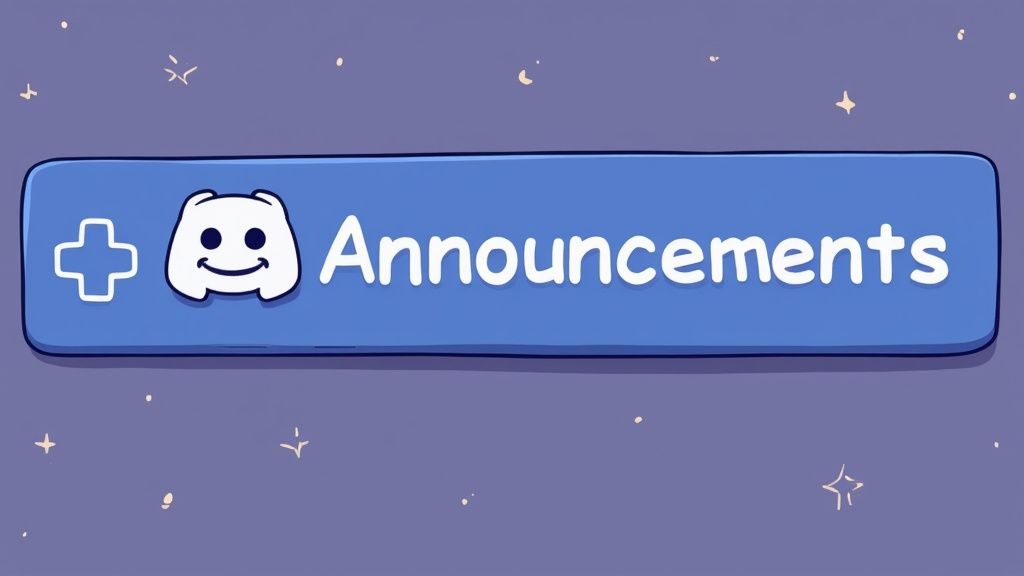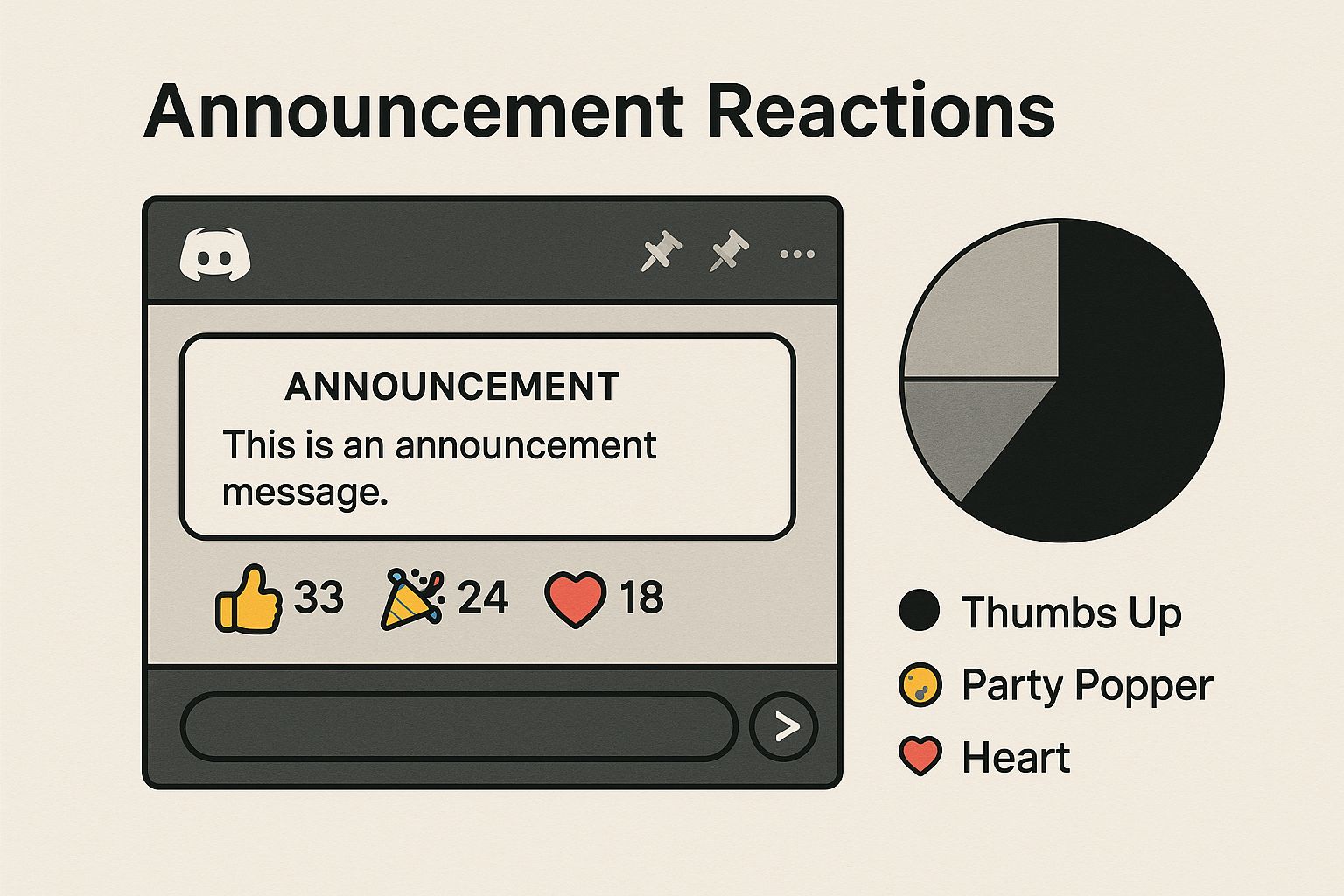Boost Your Discord Announcement Channel Today

Think of a Discord announcement channel as your server's official megaphone. It's the one spot where every member can find crucial updates, news, and event details without having to dig through a mountain of memes and off-topic chatter. It’s how you bring order to the chaos.
Why Your Server Needs a Great Announcement Channel
Ever post a super important update, only to watch it get immediately buried by a dozen Gifs? We've all been there. A well-run announcement channel cuts right through that noise. It creates a single source of truth, giving you a direct line to your community.
This is more than just a place to dump news. It's about building your community's trusted information hub—the digital town square where everyone gathers for the real scoop.
Build Authority and Trust
When members know exactly where to go for official info, you eliminate confusion and squash rumors before they start. By locking the channel so only specific roles can post, you're sending a clear message: what's posted here matters. This simple step builds a ton of trust and trains members to pay attention when a new notification pops up.
A dedicated announcement channel is the central nervous system for your community. It ensures that vital information isn’t just sent, but actually received and understood—and that’s the foundation of great community management.
The core ideas here aren't new. In fact, many organizations rely on powerful internal communication strategies built on these same principles of clarity and consistency. The same rules apply whether you're running a massive corporation or a tight-knit gaming clan.
Connect with a Growing Audience
Discord isn't some niche gamer app anymore—it's huge and getting bigger. By the end of 2025, it's expected to have around 656 million registered users.
The key demographic here is the 70% of users aged 18 to 34. This audience doesn't just appreciate clear communication; they expect it. For them, a dedicated discord announcement channel isn't a "nice-to-have," it's a basic requirement for a well-managed server. You can dive deeper into these trends in this detailed report on Discord's growth. This channel is your ticket to keeping everyone on the same page.
Getting Your First Announcement Channel Off the Ground
Alright, let's get down to business and build the command center for your server. Setting up a proper Discord announcement channel isn't just about clicking a button; it's about creating a space for clear, direct communication right from the get-go.
First things first: the name. Keep it simple and obvious. Something like #announcements or #server-updates tells everyone, especially new members, exactly what to expect. No confusion, just clarity.
When you go to create the channel, Discord will ask if you want a "Text Channel" or an "Announcement Channel." You absolutely want to pick Announcement Channel. This unlocks the "Follow" button, a seriously powerful feature that lets other server owners pipe your updates directly into their own communities. It’s a fantastic way to spread your message.
If you're looking to get a bit more advanced and automate things, you can even find templates for sending custom Discord notifications that can really save you some time. Check out this one to see what I mean: https://domino.run/explore/templates/discord-notification-237
Nailing the Permissions
You've created the channel. Now, lock it down. The whole point is to have a one-way street for official info, not another chat room filled with memes and "hey" messages. You need to set it to read-only for the average member.
Before you can even designate a channel as an official announcement channel, you need to have "Community" features enabled on your server. It’s a prerequisite. This is what it looks like in your server settings:

Flipping that switch is what gives you access to all the good stuff—Server Insights, Welcome Screens, and the channel type we're talking about now.
For your new #announcements channel, head straight to the permissions tab and tweak the settings for the @everyone role. Here’s the magic formula:
- View Channel: ✅ Turn this ON.
- Send Messages: ❌ Turn this OFF. This is the big one.
- Read Message History: ✅ Turn this ON, so new folks can catch up.
This simple setup is the key. It ensures every single member can see your updates, but only the people you trust (Admins, Mods, etc.) can actually post. Honestly, this is the most critical step to keeping your Discord announcement channel clean and effective. After this, you can go back and give specific staff roles permission to post.
Getting Your Roles and Permissions Right
An announcement channel's real magic isn't just in what you post, but in who can't post. Getting a handle on your roles and permissions is what separates a clean, official bulletin board from a chaotic free-for-all. This is where you draw a clear line in the sand: here are the broadcasters, and here is everyone else.
The very first thing you need to do is tame the @everyone role for this specific channel. Head into your channel's permission settings and turn off Send Messages for @everyone. Just like that, you've cut out the noise. This one simple toggle ensures that only designated people can post, keeping the channel focused and clutter-free.
Setting Up the Essentials
Now, just because you've muted the general audience doesn't mean you want to shut them out completely. Engagement is still the name of the game.
A great way to do this is by leaving the Add Reactions permission turned on for @everyone. This lets members react with emojis to your announcements, giving you instant, at-a-glance feedback without a single message derailing the conversation.
It’s a clean, simple way to gauge how your community feels about an update.

This kind of reaction-based feedback is invaluable. You can see if news is exciting, confusing, or just plain 'meh' without opening the floodgates to a full-blown discussion in a channel meant for one-way communication.
Creating Roles for Your Announcers
You probably don't want to hand out full admin powers just so someone can post an update. That's where custom roles come in. This is a standard practice across the 30 million+ active servers on Discord for a reason—it works.
Here's a pro tip: Never give someone full admin just to post. Instead, create a specific role like 'Moderator' or 'Announcer.' Then, in your announcement channel's settings, grant only that role the 'Send Messages' permission. It's the secret to delegating work without handing over the keys to your entire server.
Here’s a quick reference table to help you visualize the most important permissions to set for your announcement channel.
Essential Permissions for Your Announcement Channel
| Role | Send Messages | Manage Messages | Read Message History | Add Reactions |
|---|---|---|---|---|
| @everyone | ❌ (Crucial) | ❌ | ✅ | ✅ |
| Moderator | ✅ | ✅ | ✅ | ✅ |
| Announcer | ✅ | ❌ | ✅ | ✅ |
As you can see, you can create a tiered system. Moderators can post and clean up, while a dedicated 'Announcer' role might only be able to post their own messages. This granular control is what keeps your server secure and your team empowered.
For a deeper dive into all the ways permissions can work together, you should check out our comprehensive guide on roles in Discord. By thoughtfully deciding who can do what, you make sure your announcement channel stays the clear, respected source of information it's meant to be.
Writing Announcements People Actually Want to Read
So you’ve got the channel set up perfectly. Great! But all the technical wizardry in the world won't matter if your announcements are a snooze-fest. A silent or boring Discord announcement channel is just as useless as a chaotic one. Let's switch gears from the "how" of setup to the "what" of writing messages that get people excited.
First things first: respect the ping. Abusing the @everyone tag is the quickest way to get your entire channel muted into oblivion. Seriously, save that power move for the big stuff—major rule changes, server-wide events, or anything so important that every single person absolutely needs to know.
For something happening right now, like an impromptu movie night, @here is your best friend. It only pokes the people who are actually online, making it way less intrusive.
Make Your Messages Easy on the Eyes
Let's be real, nobody reads walls of text online. We scan. Your job is to format your announcements for the scanners. Ditch the dense paragraphs and embrace some simple formatting tricks.
Discord's built-in Markdown is perfect for this:
- Use bold text to make key details like dates, times, or calls to action pop.
- Italics are great for adding a little extra emphasis or a touch of personality.
- Bullet points are your go-to for listing things like patch note features or event sign-up instructions.
Think about it. If you're announcing a gaming tournament, which is easier to read? A clunky paragraph or something clean and simple like this:
## 🏆 Monthly Apex Tournament! 🏆**Date:** Saturday, October 26th**Time:** 4:00 PM EST**Sign-up:** React with a 🎉 below!
It’s a no-brainer. The second one gets the point across in seconds.
It’s Not Just About the Words
Text is only half the battle. A good GIF, a relevant image, or even a custom emoji can make your announcement 10x more engaging. Visuals are attention-grabbers and can set a mood way faster than words ever could. Announcing a chill community night? Throw in a lo-fi GIF. Celebrating a server milestone? That's the perfect time for a custom graphic.
Your goal isn't just to push out information; it's to build a connection. Find a consistent voice—whether it's super professional, a bit witty, or just full of hype—and stick with it. It makes your announcements feel like they're coming from a real person, not some faceless bot.
Finally, get smart with your notifications. If you have news that only applies to a specific group, use role pings! Tagging @Valorant Squad for a new agent drop is way more effective (and less annoying) than blasting the whole server. This kind of targeted approach shows you respect people's time, making them pay more attention when they do get a notification from you. It's these little things that turn a basic Discord announcement channel into the true heartbeat of your community.
Amplify Your Reach with Channel Following

Alright, ready for a pro-level move? One of the most underused tools in a server owner's toolkit is the "Follow" feature. It essentially turns your Discord announcement channel from a simple bulletin board into a powerful broadcasting network, letting other communities pipe your updates directly into their own servers.
This is an absolute game-changer for creators, game developers, or anyone managing a project with a bunch of different fan communities. Imagine you push out new patch notes or a product launch, and it instantly appears in dozens of partner or fan-run servers. That's what enabling Channel Following can do—it expands your reach far beyond your own server walls.
How Following Works
Once you've officially made a channel an "Announcement Channel," a little "Follow" button pops up. When an admin from another server clicks it, they can pick a channel in their own community to receive your posts. From then on, any message you publish in your announcement channel gets automatically reposted there.
This creates a super cool, interconnected web of information. Of course, to get other servers to follow you, your announcements have to be consistently valuable and relevant to their members. To really make sure your content lands and grows your community, it's worth digging into some proven strategies to increase social media engagement and reach.
The secret is making your content so good that other server admins want to share it. Think exclusive sneak peeks, critical updates, or community event invites that add real value to their own members.
You can even take it a step further with automation. For Web3 communities, you could automatically launch a React on Discord Zealy quest for each new announcement. This turns passive readers into active participants, making your announcement channel an indispensable resource and building an organic distribution network that does the heavy lifting for you.
Got Questions? We've Got Answers
Even when you've got your announcement channel dialed in, questions are going to pop up. It happens to everyone. Let's run through some of the most common ones I hear from server admins so you can troubleshoot and optimize your own channel on the fly.
One of the biggest hurdles is figuring out how often to post. Honestly, there's no magic number. The real key is quality, not quantity. If you ping your members every day with minor news, they're going to hit that mute button faster than you can say "spam." A much better approach is to roll up smaller updates into a single, neat weekly digest.
Save those one-off pings for things that genuinely can't wait—think major events, important server changes, or a last-chance opportunity. This trains your community to sit up and pay attention because they know when that notification hits, it's something they actually need to see.
This way, every announcement feels valuable, not just like more noise.
Answering the Big Three
Beyond the "how often" question, a few other things tend to trip people up. Nailing these can make a huge difference in your workflow and how your community feels about the channel.
Here are the top questions and the straight-up answers:
Can I schedule announcements to post automatically?
Right out of the box, Discord doesn't have a built-in scheduler. But don't worry, this is an easy fix with bots. Powerhouses like MEE6, Carl-bot, or Dyno have great scheduling commands. This is a total game-changer for planning content ahead of time or making sure posts go out when your community is most active, especially across different time zones.What's the difference between @everyone and @here?
This one is crucial. Think of @everyone as the big red button. It pings every single person in the server, whether they're online or not. You really want to save this for your most critical, absolutely-must-see news. On the other hand, @here is way more chill. It only pings members who are currently online and active. It's perfect for more immediate things, like letting people know a voice event is starting in 5 minutes.How do I even know if my announcements are working?
Just look at the reactions! If you have emoji reactions turned on, they're your best friend for quick, easy feedback. Are people dropping a 🎉 or a 🔥? Or is it just... crickets? That's your most basic engagement metric right there. If you have a Community server, you can dive deeper with Discord's built-in Server Insights to see how things like member retention are affected by your big announcements.
Getting a handle on these common scenarios will help you run an announcement channel that doesn't just talk at your community, but actually gets them involved.
Ready to turn your announcements into exciting, reward-based community events? Domino makes it easy to create automated quests that trigger from your Discord posts, boosting engagement without any coding required. Start building your first quest with Domino today